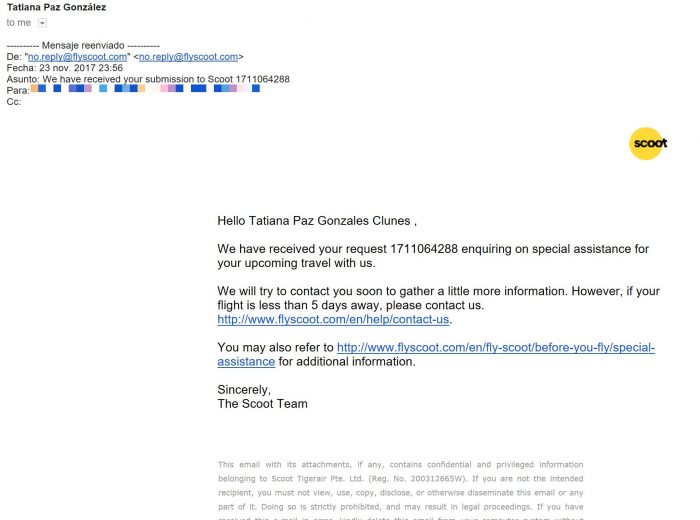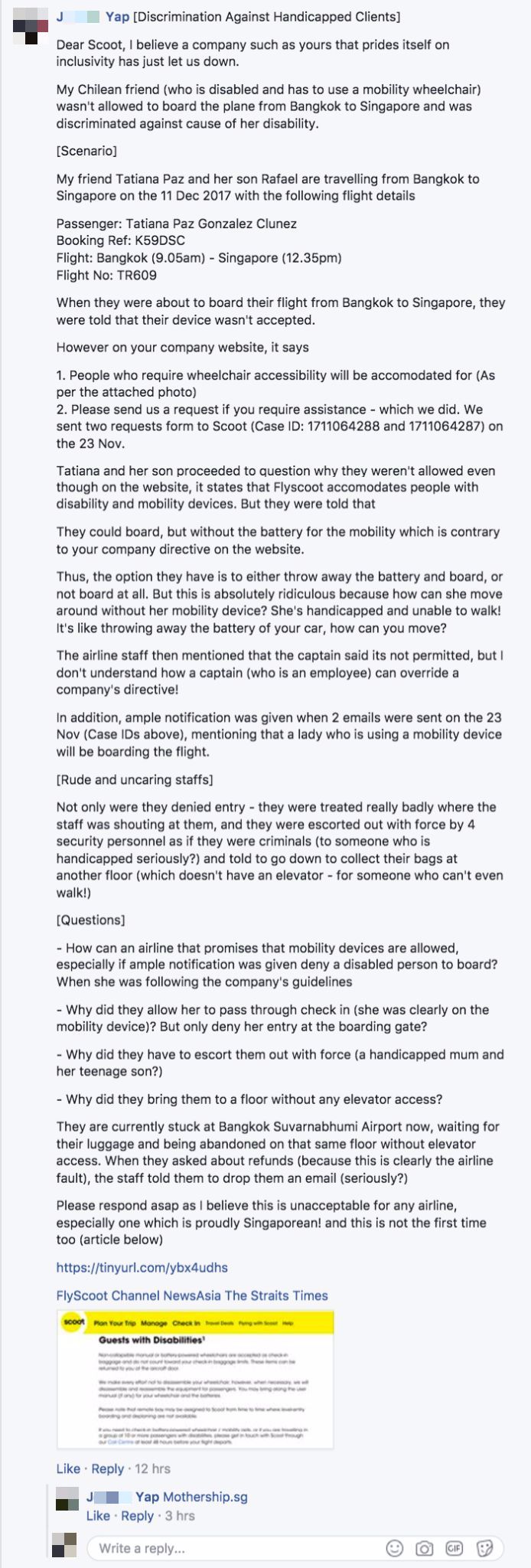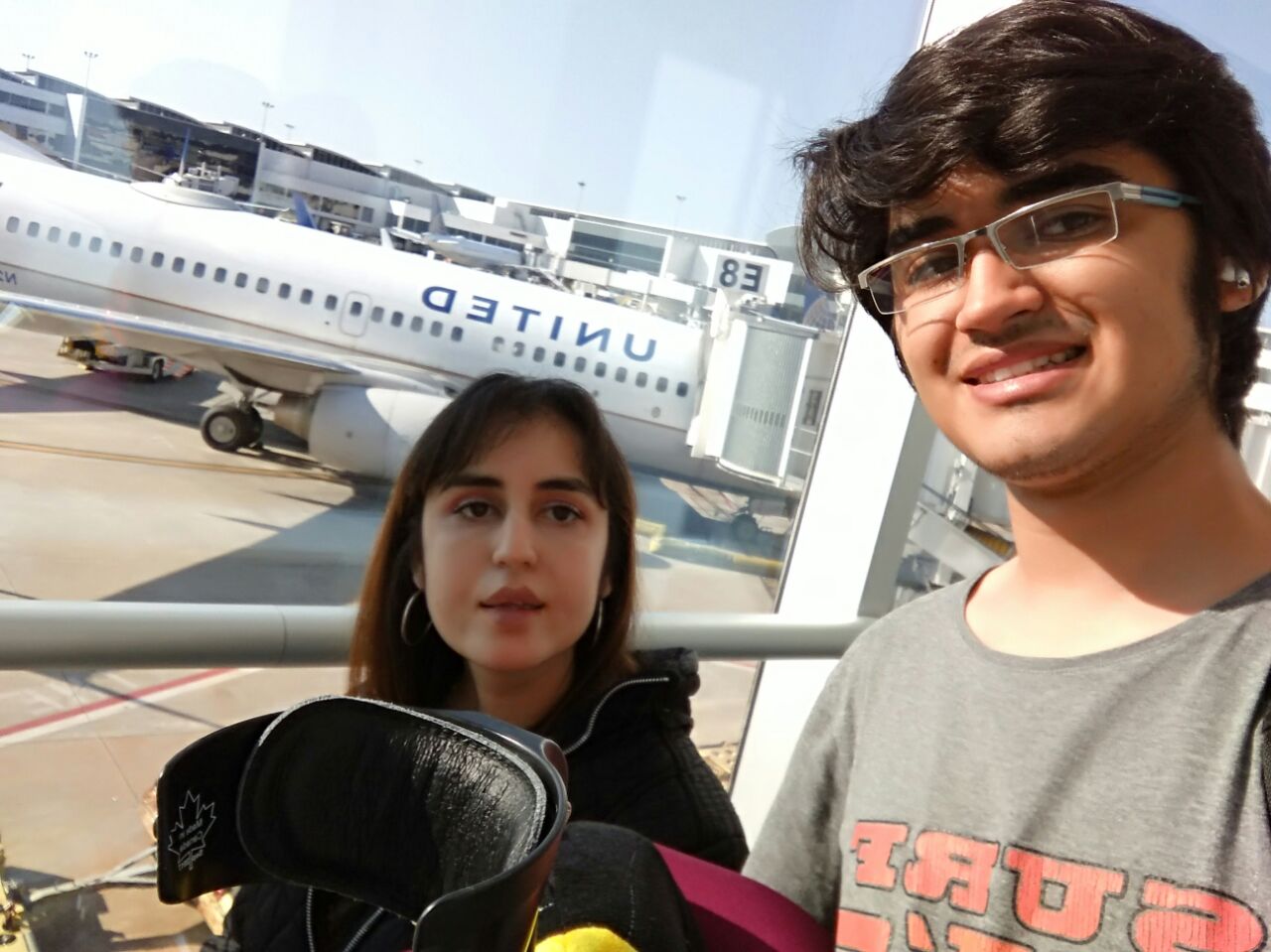If you happen to have disabilities, travelling can be tough — especially when the vehicle or mobility aid you rely on is refused on board.
Tatiana Paz Gonzales Clunes, 40, is from Tomé, a city in Chile. She works as a pharmacist, and has a 19-year-old son named Rafael Estaban Cruz Gonzalez.
Clunes has muscular dystrophy, and uses an electric scooter to get around. The National Disability Service of Chile has certified her to have 70 per cent disability in her legs. She is able to walk short distances on crutches, but with great difficulty, and so the scooter helps her a lot.
Both Clunes and Gonzalez are friends with 29-year-old J. Yap, a Singaporean who started a business in Chile and currently works there. As Clunes and her son had never visited Asia before, Yap urged them to tour the region. They planned a trip that would begin in Japan, then continue through Thailand, and Singapore, before ending in Malaysia.
Speaking to Mothership, Yap and Gonzalez shared the harrowing experience Gonzalez and Clunes had travelling with her mobility device from Bangkok to Singapore, thanks to conflicting instructions from Scoot, the budget carrier they flew with.
Mindful of Clunes's condition and needs, they selected Scoot for their Asia flights (Tokyo —> Bangkok —> Singapore), which they thought would be able to handle passengers with special needs.
Informed Scoot 6 days before trip, but got no reply
Clunes and Gonzalez knew that passengers should inform Scoot in advance to let them know she had special needs. They sent an email and received an automatic reply (see below):
 Pic courtesy of J. Yap.
Pic courtesy of J. Yap.
But according to Gonzalez, Scoot did not send any follow-up email seeking or containing any additional details from him or his mother — Gonzalez was the main point of contact because Clunes does not speak English and only reads it at a very basic level.
As the date of their flight approached, Gonzalez emailed Scoot again. Again, there was no reply.
Clunes's electric scooter is collapsible, and can fold up. It is powered by a detachable dry-cell battery pack.
 Screenshot from Scoot website
Screenshot from Scoot website
According to Scoot's guidelines, it is clearly stated that mobility aids powered by dry cell batteries have no plane carriage restrictions. Passengers just need to switch them off and check them in, and the passenger would receive wheelchair assistance at the airport. Mobility aids also do not count towards check-in luggage limits.
How other airlines handled the scooter
Clunes and Gonzalez travelled by United Airlines from Chile to Tokyo, stopping over in Houston, Texas, on Nov. 29. Clunes was initially allowed to ride her scooter to the boarding gate, whereupon it was taken and placed into the cargo hold.
When the pair arrived late for their Scoot flight from Tokyo to Bangkok, they booked another flight and got there via AirAsia instead. Clunes was allowed to do the same thing as she did when flying by United — she was wheeled onto the plane, and her scooter was disassembled and placed into the plane's cargo hold.
So far, so good. But it was when they finally were to fly by Scoot to Singapore that things would take a turn for the worse.
[related_story]
Trouble in Bangkok
In Bangkok, Clunes and Gonzalez reached the airport on time and went to the check-in counter. Gonzalez recalls telling Scoot's staff at the counter about the scooter.
"I asked if there was any problem with this scooter, they said ok. We will let you check in, but the captain will decide if we can allow the scooter or not. I asked the staff if there was any problem with the battery, she said no, there's no problem."
When they reached the boarding gate, the Scoot staff there asked Gonzalez to remove the battery pack from the scooter. He did so. But then the staff asked him to dispose of the battery pack before they could come on board.
Gonzalez appealed for a solution — because obviously, the scooter won't work without its batteries — but the staff at the boarding gate, he said, were not forthcoming with ideas or help. When Gonzalez mentioned that he had emailed Scoot in advance to inform them of his mother's condition but had received no reply, he told Mothership that he was told the following:
"If the Scoot web service didn't answer you, the responsibility for not answering is yours."
Gonzalez then asked to speak to someone in charge. The staff said that the final decision would be made by the captain. The captain appeared, and spoke to Gonzalez.
"He said, 'Ok, we can't take the battery, so either you dispose of the battery or you are not getting into Singapore'. I told him this scooter is my mum's legs — I cannot dispose of the battery."
The captain said he could not risk the safety of other passengers on board, to which Gonzalez replied that he understood, but he could not simply throw the battery away.
As we mentioned earlier, mobility aids with dry cell batteries can be safely stowed in cargo as check-in luggage.
While the staff at the check-in counter might have made a mistake in telling Gonzalez that there were no issues with the batteries, the captain could have ordered that the scooter be turned off and stowed in the cargo hold, and then allowed them on board — as with what the other two airlines did.
Again, Gonzalez asked Scoot to help him come up with a solution. But according to Gonzalez, the captain then said right in front of him:
"Ok. He's saying no (to discarding the batteries), then I will go (i.e. take off without Gonzalez and Clunes)."
Left stranded
The captain left without another word, and Gonzalez recounts how the Scoot staff removed their luggage from the plane in front of everyone watching.
"My mum was crying, and they still don't give us a solution. I asked at least for my money back, as the flight cost US$300, but they didn't give it."
At this point, Gonzalez turned on his phone to record the conversation, but he was told to stop recording, or else they would call security.
He then called Yap for help, who in turn called Scoot's Singapore helpline. Said Yap:
"Someone answered and they mentioned that they will get back to us shortly, as I mentioned that they were stuck at Bangkok airport. Although it's been more than eight hours since (as of Dec 11, 8pm Singapore time) and there was no response."
With no help provided by the helpline in Singapore, Gonzalez had no choice but to fork out more money and book another flight with Cathay Pacific, which cost him a further US$380.
Fortunately, they did not encounter any problems with Cathay Pacific. Their staff inspected the battery pack at the check-in counter, and provided wheelchair assistance for Clunes.
Gonzalez was allowed to bring the battery pack with him as carry-on luggage while the scooter was placed in the cargo hold as check-in luggage. Mother and son landed safely in Singapore on Monday, Dec. 11. afternoon.
Scoot apologises
Also speaking to Mothership, Yap expressed his disappointment that a Singaporean airline caused his Chilean friends so much trouble.
"It was at my urging that they decided to explore Southeast Asia, and it's exceptionally disheartening to me because it was a Singaporean-owned airline that gave them such horrible treatment."
Yap said he tried to post on Scoot's Facebook page to inform them of the incident, but he was not allowed to do so. He eventually posted his message as a reply to one of Scoot's own Facebook posts.
 Screenshot via Scoot's Facebook post
Screenshot via Scoot's Facebook post
However, Scoot did not reply to his comment on its page.
Gonzalez formerly majored in electronics engineering at the University of Concepción in Chile, but has since left school to run his own start-up and teaches classes in robotics.
He told Mothership he and his mother were looking forward to visiting the Gardens by the Bay and the Resorts World Sentosa SEA aquarium for their first visit to Singapore, but he now says he will not fly with Scoot in future.
In a statement provided to Mothership, a spokesperson for Scoot apologised for their experience and said the airline would review their processes to make sure this miscommunication won't happen again:
"We apologise for the inconvenience and the unhappiness caused to our two guests. Our investigations revealed that the Captain had assessed that the passenger’s proposed manner of carriage for the wheelchair’s batteries did not fully comply with our guidelines, which can be found on our website. Hence the Captain declined to carry the batteries.
We also learnt that the passenger was previously advised by our Call Centre that the wheelchair had to be checked-in, however they were not informed on the appropriate method of packing the batteries. We will be reviewing our processes to avoid a recurrence.
Meanwhile, we have reached out to the passengers."
However, Gonzalez says he has yet to hear from Scoot.
Top image courtesy of Rafael Gonzalez.
If you like what you read, follow us on Facebook, Instagram, Twitter and Telegram to get the latest updates.
